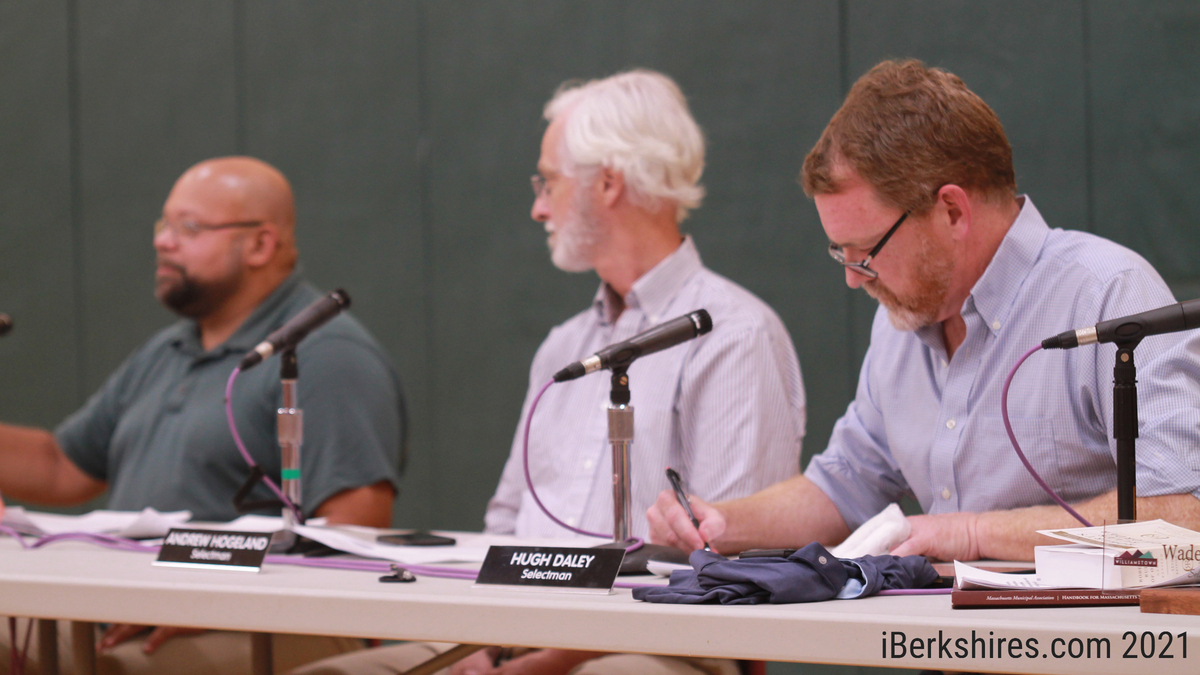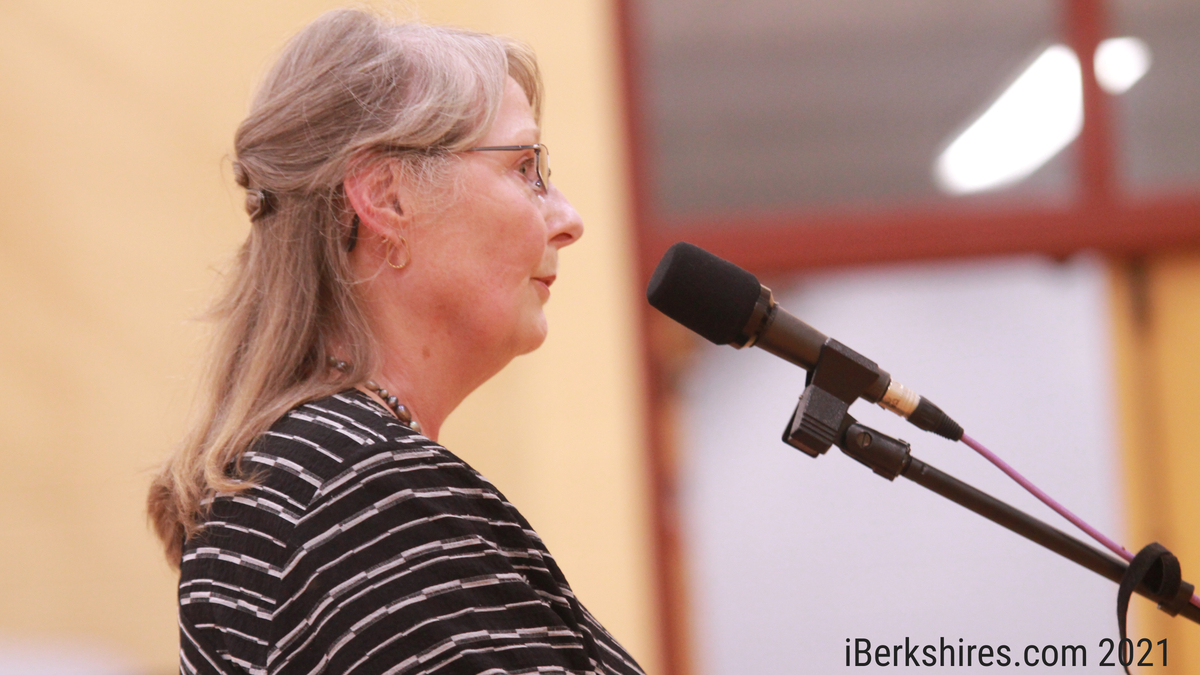Williamstown Community Needs Survey, Cost Draws IreBy Stephen Dravis, iBerkshires Staff
04:17AM / Tuesday, July 27, 2021 | |
 Select Board members Jeffrey Johnson, left, Andrew Hogeland and Hugh Daley participate in Monday's meeting held at the elementary school. Select Board members Jeffrey Johnson, left, Andrew Hogeland and Hugh Daley participate in Monday's meeting held at the elementary school. |

Carrie Waara, above, asks the Select Board to be 'champions' of the Williamstown Cares Community Assessment and Research project. Nat Romano, right, supports the survey but thinks the town shouldn't be footing cost for it.
WILLIAMSTOWN, Mass. — The Select Board on Monday heard concerns from multiple residents about the cost and direction of a community needs assessment project that the town began earlier this year.
The Williamstown Cares Community Assessment and Research project came under fire for what some alleged is an attempt to draw a "biased" sample of respondents to study the community's public safety needs. It also was defended by residents who made the case that the town needs to hear from voices that historically have been ignored.
According to the study's page on the town's website, the social scientists involved "want to hear from as many community members as possible, and especially from those who feel unsafe, unwelcome, or excluded in our town."
"This approach is likely to result in a biased and non-representative sample, not a representative sample," said Luana Maroja, a professor of biology at Williams College. "In fact, it seems like an attempt to support a pre-ordained conclusion that people in Williamstown feel unsafe, and the police are incompetent or even responsible for that.
"As a scientist, I object to studies designed not to find out the truth, but to prop up a conclusion reached before the study has started."
Maroja said the town needs to have the data analyzed by a disinterested third party with no connection to the town in order to validate any conclusions.
"Biased data with biased analysis, which seeks to prop up a pro-ordained, ideological conclusion will not and should not be taken seriously," she said. "Such data will fail in its goal of, 'understanding the views of Williamstown residents in order to provide recommendations to the town.'"
Maroja's comments touched off a lengthy discussion during the public comment portion of a meeting that began with an hourlong conversation with Berkshire District Attorney Andrea Harrington about the purpose and procedures of her office's "Brady list" of law enforcement officers whose past actions need to be revealed to defense attorneys during criminal prosecutions.
That discussion grew out of a desire by members of the Select Board to get more information about the inclusion of a Williamstown police officer on that list and a more restrictive "do not call" list for officers who cannot be used by a prosecuting attorney without the review of a supervisor.
The Brady list is one aspect of a wider community conversation about policing that began in the summer of 2020 and led, among other things, to the Williamstown Cares research project.
Earlier this month, the Select Board learned that the community needs assessment, which grew out of conversations between local social workers and the previous town manager, was projected to run over budget by about $87,000.
That price tag also drew fire from Ralph Hammann, who added it to a list of other expenditures the town has incurred in the fallout from a since-dropped federal lawsuit filed by a member of the Police Department. By Hammann's reckoning, using numbers provided by the town and undisputed by the Select Board and interim town manager on Monday, the total cost in the wake of the lawsuit filed by Sgt. Scott McGowan is about $872,000 — including legal fees and separation agreements with former Town Manager Jason Hoch and former Police Chief Kyle Johnson — even before the Williamstown Cares overrun is factored in.
Hammann, who also said he was afraid the research project had a "procedural bias," later read a letter from South Williamstown resident Donna Wied, who was unable to attend Monday's meeting at the Williamstown Elementary School gymnasium in person.
"In 2020, with benevolent intentions, at the end of a long and steamy town meeting, the 227 remaining citizens pledged to strictly review Williamstown's policies and practices and to change those that were unjust, especially to 'marginalized people,'" Wied wrote. "Our town's commendable willingness to take a hard look in the mirror seems now to have morphed into madness. And this current madness has soaring costs, both monetary and social. Many townsfolk allege that a significant and very costly survey is skewed from the start."
Although at least one social worker associated with the research project was among the crowd of about 50 in the gymnasium, the project itself was not on the agenda for discussion, and no one involved was asked by the Select Board to give more information about their endeavor.
But several residents spoke from the floor to refute the idea that the research project is "too expensive" or that an effort to lift up the voices of marginalized residents represents "bias."
Randall Fippinger said he is "very much in favor" of the research project, which he said is critical to understanding what is happening in town.
"I think … it is, in terms of equity, it is important for us to focus on marginalized voices who don't feel comfortable talking in this town," said Fippinger, who earlier this summer was appointed by the Select Board to serve on the town's Diversity, Inclusion and Racial Equity Committee. "If you feel safe in this town, this culture is meant for you. But some people don't feel safe, and I think it's important to bring that to the fore and make an effort to do that."
Carrie Waara called on the Select Board members themselves to be advocates for the Williamstown Cares project.
"The last two years included terrible violence and pain on the part of marginalized people in our town as well as globally," Waara said. "The benefits of this research project are being forgotten. You need to move beyond the myth-making and extremist attacks I've read and hear and champion it."
Nat Romano told the Select Board that while the research project has merits, it should not be funded by the town.
"From a budgetary standpoint, there are better things for us to consider than funding a major academic research study, which really … should be funded by an academic research institution," Romano said. "We're a town. It's not our job to bankroll large scale academic surveys.
"I believe in the merits of the survey, but I don't believe the town should be footing the bill for it."
Molly Polk disagreed.
"It's important that we see the costs, it's important to understand those costs, but I think we also need to look, historically, at the cost of marginalization and discrimination in our community since its inception," Polk said. "I work with young children who ask me questions about the original, indigenous inhabitants of our region, what had happened to those people over hundreds of years.
"I'm not trying to wax philosophical, but we really need to take that seriously. There are costs to running this survey, but there are also costs people have experienced when they lost land, their home, their livelihood, etc. These are things to consider that really, really matter, not just to me but to young people in our community who want to make it their home."
Another set of financial costs cited by Hammann drew the interest of Andrew Wells, who asked to know why the town only learned of the payouts to Hoch and Johnson during a Finance Committee meeting this summer.
Select Board Chair Andrew Hogeland said the separation agreement with Hoch was voted on by the board in a public meeting, and Jane Patton added that it was "absolutely discussed" by the board in open session.
"Not the amount," resident Anthony Boskovich interjected from his chair.
"Thank you," Patton responded. "I know that. We talked about the agreement. There was a vote. It was not a unanimous vote. ... The information was available. We did not say the number out loud."
The discussion and roll call vote on Hoch's separation agreement at the board's Feb. 22 meeting lasted just 65 seconds out of a 93-minute virtual meeting with no specifics shared about the agreement. The only board member to comment on it at all was Patton, who said her no vote in a 4-1 decision to approve the agreement was "has to do with the terms of the agreement and not the separation."
No documents on the separation agreement, which was negotiated in executive session, were available in the public meeting packet on the town's website.
| 
